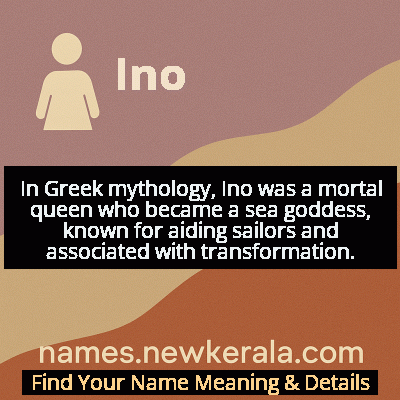Ino Name Meaning & Details
Origin, Popularity, Numerology Analysis & Name Meaning of Ino
Discover the origin, meaning, and cultural significance of the name INO. Delve into its historical roots and explore the lasting impact it has had on communities and traditions.
Name
Ino
Gender
Female
Origin
Greek
Lucky Number
2
Meaning of the Name - Ino
In Greek mythology, Ino was a mortal queen who became a sea goddess, known for aiding sailors and associated with transformation.
Ino - Complete Numerology Analysis
Your Numerology Number
Based on Pythagorean Numerology System
Ruling Planet
Moon
Positive Nature
Diplomatic, friendly, artistic, empathetic.
Negative Traits
Over-sensitive, moody, indecisive, prone to self-pity.
Lucky Colours
Green, cream, white.
Lucky Days
Monday.
Lucky Stones
Pearl, moonstone.
Harmony Numbers
1, 3, 4.
Best Suited Professions
Diplomats, mediators, caregivers, artists.
What People Like About You
Cooperative spirit, friendliness, artistic talent.
Famous People Named Ino
Ino of Thebes
Mythological Queen and Sea Goddess
Transformed into Leucothea, protector of sailors and savior of Odysseus
Ino Bat
Slovene Writer and Poet
Significant contributions to Slovene literature and children's literature
Ino Hidefumi
Japanese Composer
Award-winning video game music composer for major franchises
Ino Kanori
Japanese Ethnologist
Pioneering documentation of Taiwanese indigenous cultures
Name Variations & International Equivalents
Click on blue names to explore their detailed meanings. Gray names with will be available soon.
Cultural & Historical Significance
The name's cultural resonance extends beyond ancient Greece into modern interpretations of classical mythology. During the Renaissance, Ino's story was revisited by artists and writers exploring themes of transformation and divine mercy. In contemporary times, her narrative continues to inspire feminist reinterpretations of mythological women, examining how female characters navigate patriarchal divine systems. The name carries particular weight in literary and academic circles, where it represents both the richness of Greek mythological tradition and the ongoing relevance of classical themes in understanding human experience. Her story's elements of madness, sacrifice, and transformation continue to resonate in psychological and literary analyses of mythological characters.
Extended Personality Analysis
The name Ino evokes personality traits deeply connected to its mythological origins, suggesting individuals who embody transformation, protection, and resilience. Those named Ino often display remarkable adaptability, able to navigate significant life changes with grace and emerge stronger from challenges. This mirrors the mythological Ino's journey from mortal queen to sea goddess, indicating someone who can reinvent themselves while maintaining core values. Their protective nature is typically pronounced, showing fierce loyalty and willingness to sacrifice for loved ones, reflecting the original Ino's desperate attempts to save her children. These individuals often possess intuitive wisdom and emotional depth, making them natural counselors or supporters during crises.
Ino-named individuals frequently demonstrate a connection to nature, particularly water elements, and may find peace and inspiration in marine environments. They tend to be compassionate toward those in distress, often serving as stabilizing forces in turbulent situations. Their personality combines practical problem-solving with spiritual insight, allowing them to bridge different perspectives effectively. While they may experience intense emotional journeys, they typically develop profound inner strength and wisdom through their experiences. The name suggests someone who understands suffering but uses that understanding to help others, embodying the redemptive quality of their mythological namesake. Their transformative nature means they often inspire growth in those around them while continuously evolving themselves.
Modern Usage & Popularity
In contemporary naming practices, Ino remains a distinctive choice that appeals to parents seeking names with mythological depth and unique character. While never achieving widespread popularity, the name maintains a steady presence among families with classical interests, particularly in academic and artistic communities. The 21st century has seen a mild resurgence in mythological names, with Ino benefiting from this trend alongside names like Athena, Orion, and Persephone. In Japan, the name gained visibility through popular culture, particularly the Naruto character Ino Yamanaka, though it remains uncommon. Modern usage often reflects parents' desire for names that are both meaningful and uncommon, with Ino offering classical resonance without being overused. The name appears more frequently in European countries with strong classical education traditions and among families of Greek heritage. Recent years show increased usage in creative industries and among parents who value literary and historical references, positioning Ino as a sophisticated alternative to more common mythological names while maintaining its unique character and deep cultural roots.
Symbolic & Spiritual Meanings
Symbolically, Ino represents one of mythology's most powerful narratives of transformation and redemption. Her journey from mortal suffering to divine purpose embodies the archetype of death and rebirth, making the name symbolic of profound personal transformation and spiritual evolution. As Leucothea, the 'white goddess,' she connects to lunar symbolism, intuition, and feminine wisdom, representing guidance through darkness and protection during perilous journeys. The veil she gives Odysseus symbolizes divine intervention and the thin boundary between human struggle and supernatural assistance, making the name emblematic of unexpected help and spiritual support. Her maternal sacrifice and ultimate apotheosis symbolize how love and devotion can transcend even the most tragic circumstances, creating meaning from suffering. The name also carries marine symbolism, representing emotional depth, adaptability, and the ability to navigate life's storms with grace. Ino's madness and subsequent divinity symbolize the fine line between destruction and creation, suggesting that what appears as breakdown may actually be breakthrough in disguise. Ultimately, the name embodies the paradoxical unity of vulnerability and strength, mortality and divinity, suffering and redemption that lies at the heart of the human experience.

